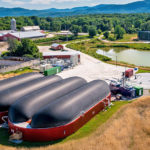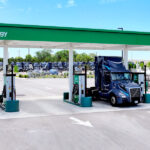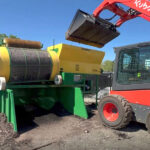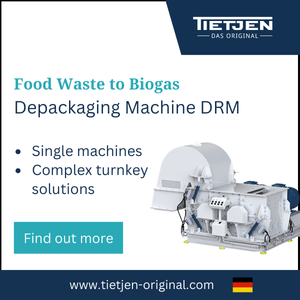BioCycle September/October 2019
Annapolis, Maryland: Maryland Regulators Publish New AD Requirements
The Maryland Department of the Environment (MDE) has published permitting guidance for anaerobic digestion (AD) facilities. These facilities may be subject to permits and approvals from other agencies including Maryland Department of Agriculture (MDA) and Maryland Public Service Commission (PSC). MDE’s guidance document is intended to assist prospective AD facilities in identifying applicable state government laws and regulations. MDE does not issue stand-alone AD facility regulations or permits. However, the General Assembly directed the agency to convene a study group with recycling stakeholders to evaluate and assist in the development of regulations that: specify when a recycling facility is exempt from a refuse disposal permit; establish design, construction, and operational conditions for recycling facilities; and a separate system of permits or approvals applicable to recycling facilities.
An AD facility could require coverage under a refuse disposal permit and be regulated as a processing facility. MDE generally has determined that a refuse disposal permit is not required for an anaerobic digestion facility if:
- • The digestate is returned to the marketplace in the form of a raw material or product;
- • The quantity of nondigestible and nonrecyclable solid waste handled at the facility remains at a de minimis (negligible) level; and
- • The facility does not cause a nuisance, pollution, or other threats to public health, safety, or comfort (as required under COMAR 26.04.07.03).
A wastewater treatment facility treating sewage through AD — or codigestion, with other non-sewage organic materials — will be required to have a Sewage Sludge Utilization Permit. MDE issues a General Permit for Storm Water Discharges Associated with Industrial Activity, a combined state and federal storm water permit authorized under the National Pollution Discharge Elimination System (NPDES) permit program. An AD facility may require coverage under this permit if its primary activity falls under specified regulated industrial activities. An AD facility that discharges wastewater, such as effluent from the digestate dewatering, into waters of the state may require a surface water or groundwater discharge permit.
MDA’s State Chemist Section regulates the sale and distribution of soil conditioners, including digestate, in Maryland. Distributors of digestate are required to annually register each brand and grade of commercial fertilizers or each product name of soil conditioners (COMAR 15.18.03.02). To register digestate as a commercial fertilizer, the distributor must include a legal claim of the digestate’s minimum percentages of plant nutrient content; these percentages cannot change after registration. To register digestate as a soil conditioner, the distributor must only include a statement of digestate composition.
PSC regulates electric utilities operating in Maryland, sets tariff rates for electricity distribution, approves the construction of electric generating stations, and licenses electric suppliers. An AD facility that proposes to construct or modify a small electric generating station must obtain permission to construct from PSC.
Washington, D.C.: House Bill Proposes Tax Credit For Biogas
In mid-August, two members of Congress — Elise Stefanik (R-NY) and Scott Peters (D-CA) — introduced the Renewable Electricity Tax Credit Equalization Act (H.R. 4186), a bill that renews and extends a tax credit for qualifying renewable energy technologies that expired in 2017. It would reinstate the production tax credit (PTC) back to its December 2017 expiration and extend both the PTC and investment tax credit (ITC) for qualifying projects that commenced construction before 2025. The fix is critical to the biogas and waste-to-energy industries, which have been orphaned in the tax code while other renewable technologies have used similar tax credits to benefit their industries, states a press release issued by the American Biogas Council and several other industry groups.
Middlebury, Vermont: Digester Groundbreaking
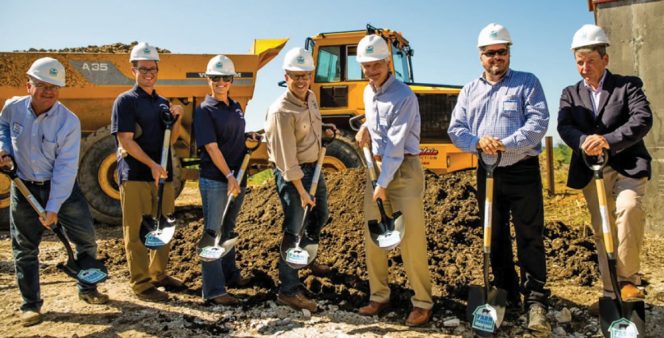 Vanguard Renewables, Middlebury College, Vermont Gas and Goodrich Farm have joined forces on an anaerobic digestion facility designed to process 100 tons of manure and 180 tons of organic food waste daily into renewable natural gas (RNG). Construction on the Farm Powered® anaerobic digester will be completed in 2020. RNG produced there will travel by pipeline to Middlebury College’s main power plant. Once the digester is operating, the gas it creates will supply about half of the energy that Middlebury uses for heating and cooling. The College’s biomass plant will continue to produce the other 50 percent. “One of the key components of Middlebury’s Energy 2028 plan is to shift the College completely to the use of renewable energy,” said David Provost, Middlebury’s executive vice president for finance and administration at a groundbreaking in August. “The digester is fundamental to this change.”
Vanguard Renewables, Middlebury College, Vermont Gas and Goodrich Farm have joined forces on an anaerobic digestion facility designed to process 100 tons of manure and 180 tons of organic food waste daily into renewable natural gas (RNG). Construction on the Farm Powered® anaerobic digester will be completed in 2020. RNG produced there will travel by pipeline to Middlebury College’s main power plant. Once the digester is operating, the gas it creates will supply about half of the energy that Middlebury uses for heating and cooling. The College’s biomass plant will continue to produce the other 50 percent. “One of the key components of Middlebury’s Energy 2028 plan is to shift the College completely to the use of renewable energy,” said David Provost, Middlebury’s executive vice president for finance and administration at a groundbreaking in August. “The digester is fundamental to this change.”
Wellesley, Mass.-based Vanguard Renewables will build, own, and operate the digester. Its Section 248 permit allows the acceptance of food waste and energy production. Vanguard is contacting local and Vermont-based food manufacturers to source the food waste. “We anticipate that we will also get food waste from the commercial and residential streams,” notes John Hanselman, Vanguard CEO. “Vermont’s Act 148 requires diversion of all food waste from the landfill by 2020, which includes residential food waste.” Vanguard owns and operates AD facilities on dairy farms in Massachusetts. The system being installed at Goodrich Farm differs from the Massachusetts installations in that it includes phosphorus (P) removal. “We made a commitment with the state to do significant P reduction in the Otter Creek Watershed,” adds Hanselman. “We are installing a dissolved air flotation and solids removal system, which will get us a good part of the way to P removal.”
The digester’s benefits to Goodrich Farm include free heat for farm use, high-quality liquid fertilizer that will reduce reliance on chemical fertilizers, and a reduction in the farm’s phosphorus levels and greenhouse gas emissions. An annual lease payment for hosting the digester will diversify the farm’s revenue sources. Located on more than 2,400 acres, the Goodrich Family Farm is a generational dairy farm with 900 milking cows. It is a member of the Agri-Mark Cabot Creamery Cooperative.
Vermont Gas and Vanguard are sharing the cost of the pipeline installation. All of the RNG produced at Goodrich Farm will go through Vermont Gas’ system and its hub in Middlebury. The digester is expected to produce 180,000 Mcf/year (one Mcf is 1,000 cubic feet of RNG). The College will buy 100,000 Mcf of the gas from Vanguard, Vermont Gas will buy 40,000 Mcf, and Vanguard will retain 40,000 Mcf.
Jessup, Maryland: Investor Interest In AD Heats Up
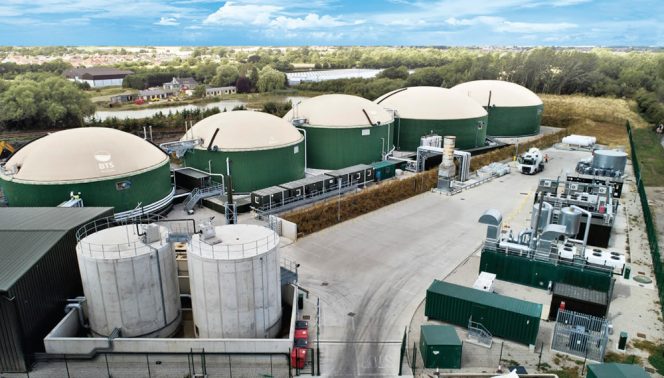
BioEnergy DevCo’s first project: BTS anaerobic digestion system at the Maryland Food Center in Jessup, Maryland.
Newlight Partners, a private equity fund founded last year by a group of former Soros Fund Management financiers, is investing $106 million in Bioenergy DevCo, a Maryland anaerobic digester developer. Bioenergy DevCo was created this year with additional funding from Sagewind Capital, a New York private equity fund, and individual investors. Earlier this year, Bioenergy DevCo bought BTS Biogas, an Italian company that has built more than 200 plants in Europe. “We did a massive amount of research and saw in the U.S. an industry that was approaching the development, technology and capital required for AD projects from 3 different directions,” explains Shawn Kreloff, CEO of BioEnergy DevCo. “We saw those as 3 legs of the total project stool and recognized if we could bring a world class technology plus experienced development people plus capital together within one entity, it would be a great opportunity to help the industry grow.”
BioEnergy DevCo’s first project is installing the BTS AD system at the Maryland Food Center in Jessup. The Maryland Food Center is among the largest produce terminals on the East Coast. “Construction is getting underway in October,” adds Kreloff, who anticipates the plant will be operational in Spring 2020.



